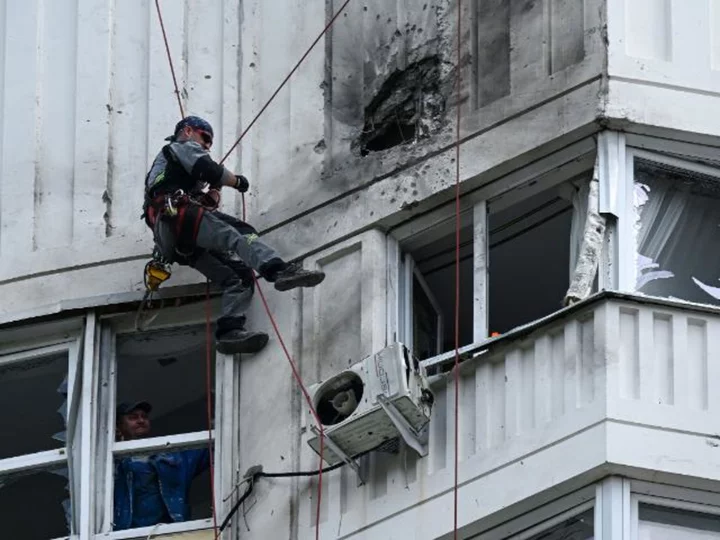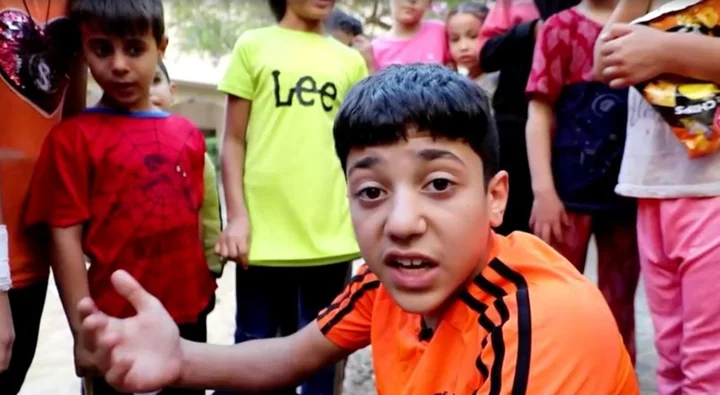Ukrainian drone strikes taking place inside Russia once seemed an unthinkable prospect. But such attacks have become an increasingly common feature of Moscow's war -- with an emboldened Kyiv warning that more will come.
A string of drone strikes have peppered Russian cities including Moscow throughout the summer. Friday saw one of the most dramatic yet -- sea drones targeted a major Russian port hundreds of miles from Ukrainian-held territory, leaving a warship listing.
They have distracted from a Ukrainian counteroffensive that is yet to produce tangible results on the battlefield, and brought the war home to Russia.
But they are not without risk for Kyiv, which is attempting to seize the front foot in the war while maintaining relations with Western nations wary of any hint of escalation.
Here's what you need to know.
A series of strikes
Ukrainian President Volodymyr Zelensky warned last week that war is "gradually returning" to Russia, after the latest in a series of drone attacks to take place inside the country that Moscow has pinned on Kyiv.
Last weekend's incidents saw buildings in Moscow targeted by drones. On Tuesday, a drone struck the same skyscraper in Moscow that was hit on Sunday.
It followed two similar attempted attacks that were reported by Russian officials earlier in July, and numerous such incidents in June. In May, an apparent drone attack above the Kremlin led to dramatic images of blasts in the skies above the seat of Russian power.
Ukraine has typically not taken direct responsibility for the attacks, though its responses have become more bullish in recent weeks. "The distance and deniability between Kyiv and these attacks is significantly less," Douglas Barrie, a senior fellow for Military Aerospace at the International Institute for Strategic Studies (IISS), told CNN. "There now seems to be almost a tacit recognition that it was (them)."
Ukrainian Minister Mykhailo Fedorov, whose Digital Transformation Ministry oversees the country's "Army of Drones" procurement plan, had said there would be more drone strikes to come as Kyiv ramps up its parallel summer counteroffensive aimed at pushing Russian troops out of Ukrainian territory.
Limited but effective weapon systems
It is difficult to establish exactly which weapons systems are being used in the attacks, and precisely which buildings are being targeted, with both the Russian and Ukrainian sides refusing to be drawn on the details of the incidents.
But there are clearly vast differences between these attacks, which are limited in scope, have caused few casualties and have not been aimed towards residential buildings, with those that Moscow has launched indiscriminately at Ukrainian population centers.
"Whether or not they're actually arriving on their intended targets, the targets do seem to be buildings that are linked with the prosecution of the war in Ukraine," Keir Giles, a Russia expert at Chatham House and the author of books on Russia's invasion and foreign policy, told CNN. "In that respect, it's a very different approach to what we've seen in Russia, with indiscriminate terror attacks."
Giles notes there is "an open question of exactly how Ukraine is doing the attacks." But the strikes have "shown up the incapacity of Russia's defenses," he added.
The one-way unmanned aerial vehicles (UAVs) that have seemingly been launched "carry a pretty small warhead and they've been used in small numbers, so in terms of direct military affect, it's limited to put it mildly," said Barrie.
"The kinds of systems that Ukraine is using are simple, comparatively speaking, but for their purpose they're effective," Barrie added.
Crucially, there is no suggestion that the weapons have been donated by the West. "These are systems (Ukraine) can manufacture themselves," Barrie said, allowing Kyiv to send military messages to the Russian people alongside its defensive war at home, which NATO nations have been supporting with military aid.
"It's fundamentally about showing that Moscow is not out of reach," Barrie said.
Bringing the war home to Russia
Kyiv will happily accept the limited military impact of the drone attacks, because the strikes play a far more important role in the war.
"Ukraine has identified that Russian popular opinion and attitudes to the war is one of the key areas that they need to target in order to bring the war to an end," Giles said. "As long as Russia can pretend that the war is something that happens elsewhere, nothing is going to dent that popular support."
Ukrainian officials have openly discussed the propaganda element of the strikes. Yurii Ihnat, a spokesman for Ukraine's Air Force, said the latest drone attacks on Moscow were aimed at impacting Russians who, since the Kremlin invaded Ukraine in February 2022, felt the war was distant.
"There's always something flying in Russia, as well as in Moscow. Now the war is affecting those who were not concerned," he said. "No matter how the Russian authorities would like to turn a blind eye on this by saying they have intercepted everything ... something does hit."
Early signals suggest that the recent attacks have caused unrest among an already jittery class of military pundits in Russia.
Noting criticisms from at least one prominent military blogger that Russia had not secured buildings against such attacks, the Institute for the Study of War (ISW) wrote in a recent update that "Russian authorities will likely struggle to balance the need to quell domestic concern over continuing drone attacks deep within the Russian rear with Russian President Vladimir Putin's continued refusal to fully mobilize Russian society for the war and its corresponding consequences."
'A startle value'
Assessing public opinion in Russia is notoriously difficult. But anecdotal accounts at least speak to the impact of drone strikes on those in the vicinity of the attacks.
"My friends and I rented an apartment to come here and unwind, and at some point, we heard an explosion -- it was like a wave, everyone jumped," one witness told Reuters after last weekend's strike in Moscow. "There was a lot of smoke, and you couldn't see anything. From above, you could see fire."
"It does seem to be achieving the kind of startle value that you might expect, where Russians are realizing that they are not personally protected from what is being done in Ukraine," Giles said of the early indications of the strikes' consequences.
Whether the trend will cause a wider rupturing of Russian support for the war is far from clear.
On the one hand, Putin's longstanding pretext for the war has relied on baseless claims that Ukraine was a threat to Russian security, and that the so-called special military operation in the country was needed to defend Russia's interest. Playing up recent attacks could be used to support that argument as the war drags on.
But after almost eighteen months of disorganization and discord, the reality that Russia's military plans are flailing has been increasingly hard to deny. And Putin's authority has previously appeared most vulnerable at moments when the impact of the war hits home in Russia -- such as during last year's chaotic military mobilization, and during June's Wagner rebellion.
In that context, it is easy to see why regular reminders of the conflict inside Russia serve Ukraine's strategic interests.
The West watches on
For all of its intended propaganda impact, sending drones into Russia is not a risk-free move for Kyiv.
The most immediate consideration is a reprisal; the Kremlin has tended to link attacks on Ukrainian cities to previous strikes on Russia, in a "tit-for-tat" approach intended to cause panic in Ukraine.
But Ukrainians are by now well acquainted to the threat of Russian air bombardments, and there has been no evidence that such assaults have dented determination in the defensive effort there.
A more prominent concern is how the West reacts to such strikes. A year ago, the prospect of Ukraine sending drones into Russia was unthinkable, given the tacit contract between NATO nations and Kyiv that the West would readily support a defensive war, but would be more wary of any actions that draw NATO into direct conflict with Russia.
There is nothing to suggest Ukraine has used NATO-provided weaponry in Russia -- doing so is likely a bridge they would not consider crossing at this time -- but it has clearly become more emboldened to take the war to Russia. And in return, Western leaders appear generally relaxed about the approach.
"The long-standing prohibition on striking into Russia that has been put in place by the suppliers ... was misplaced and misconceived," Giles said. "For all of this period, it has played Russia's game by Russia's rules."
There does remain a degree of variance in how Western leaders view attacks on Russian territory, with the United States being particularly concerned. "As a general matter we do not support attacks inside of Russia," White House spokesperson Karine Jean-Pierre told reporters late last month, according to Reuters.
But Kyiv's confidence and an increasing willingness to chip away at Russian support for the war will likely mean that such strikes remain a feature of the conflict.
"It's impossible to tell how this will develop but we should certainly expect at least this level of a steady drumbeat of demonstrations of Russian vulnerability to continue," Giles said.









